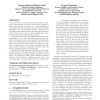283 search results - page 50 / 57 » Modelling socially intelligent virtual humans |
WWW
2006
ACM
14 years 9 months ago
2006
ACM
The asymmetry of activity in virtual communities is of great interest. While participation in the activities of virtual communities is crucial for a community's survival and ...
JUCS
2008
13 years 8 months ago
2008
: Social-aware computing is an emerging trend based on ubiquitous computing technologies and collaborative work. A successful design demands a better understanding of group tasks, ...
APGV
2006
ACM
14 years 2 months ago
2006
ACM
Understanding the robustness and rapidness of human scene categorization has been a focus of investigation in the cognitive sciences over the last decades. At the same time, progr...
ATAL
2009
Springer
14 years 3 months ago
2009
Springer
Current trends in model construction in the field of agentbased computational economics base behavior of agents on either game theoretic procedures (e.g. belief learning, fictit...
AIIDE
2009
13 years 6 months ago
2009
This paper proposes an Integrated MDP and POMDP Learning AgeNT (IMPLANT) architecture for adaptation in modern games. The modern game world basically involves a human player actin...

